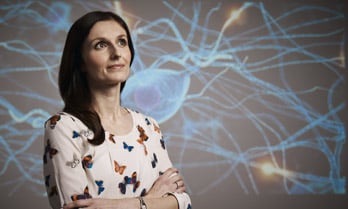Dr Elena Tucker, geneticist, Murdoch Children’s Research Institute, Melbourne
01 September 2014
Solving genetic disease mysteries
Dr Elena Tucker has brought peace of mind to families affected by rare energy disorders. She’s found genes responsible for some of these diseases.
For the thousands of families affected by these rare disorders Elena’s work provides an understanding of the causes and opens a path to management and to potential treatments one day. And the techniques she’s developing underpin the broader development of personalised medicine.
Her 2014 L’Oréal For Women in Science Fellowship, allowed her to look at hundreds of individual genomes to determine the causes of sex-determination disorders.
Qualifications
| 2011 | PhD (medical genomics), The University of Melbourne/Murdoch Childrens Research Institute, Melbourne |
| 2006 | Bachelor of Science (Honours) (genetics), The University of Melbourne/St Vincent’s Institute, Melbourne |
Career highlights, awards, fellowships, grants
| 2013–present | Postdoctoral Research Fellow, Investigating the molecular basis of disorders of sex development. Peter Doherty – Australian Biomedical Fellowship, Murdoch Childrens Research Institute |
| 2013 | Invited presentation, Victorian Institute of Forensic Medicine Seminar, Melbourne |
| 2012 | Commended for work into mitochondrial disease, Premier’s Commendation for Health and Medical Research |
| 2012 | Victorian Young Tall Poppy Science Award, Australian Institute of Policy and Science |
| 2012 | Invited presentation, AussieMit Conference, Melbourne |
| 2012 | Invited presentation, Gordon Research Conference, Boston, USA |
| 2011–2012 | Postdoctoral Research Fellow, Investigating the molecular basis of mitochondrial disease, Murdoch Childrens Research Institute |
| 2011 | Invited presentation, Institute of Neurology Besta, Italy |
| 2011 | New Investigator Award, Human Genetic Society of Australasia |
| 2011 | Kirby Travel Award, Human Genetic Society of Australasia |
| 2009 | One month collaborative residency, Broad Institute of Harvard and MIT, Boston, USA |
| 2008 | David Danks Scholarship, Murdoch Childrens Research Institute |
| 2007 | Research Assistant, Investigating the molecular basis of Parkinson’s disease, Howard Florey Institute |
Top five publications
Calvo SE, Tucker EJ, Compton AG, Kirby DM, Crawform G, Burtt NP, Rivas M, Guiducci C, Bruno DL, Goldberger OA, Redman MC, Wiltshire E, Wilson CJ, Altshuler D, Gabriel SB, Daly MJ, Thorburn DR, Mootha VK (2010) High-throughput, pooled sequencing of a patient cohort reveals mutations in NUBPL and FOXRED1 that cause human complex I deficiency, Nature Genetics 42(10): 851–858. (Impact factor 35.209, 146 citations)
Tucker EJ, Hershman SG, Köhrer C, Belcher-Timme CA, Patel J, Goldberger OA, Christodoulou J, Silberstein JM, McKenzie M, Ryan MT, Compton AG, Jaffe JD, Carr SA, Calvo SE, RajBhandary UL, Thorburn DR and Mootha VK (2011) Mutations in MTFMT underlie a human disorder of formylation causing impaired mitochondrial translation, Cell Metabolism 14(3): 428–434. (Impact factor 17.551, 29 citations)
Tucker EJ, Wanschers BF, Szklarczyk R, Mountford HS, Wijeyeratne XW, van den Brand MA, Leenders AM, Rodenburg RJ, Reljić B, Compton AG, Frazier AE, Bruno DL, Christodoulou J, Endo H, Ryan MT, Nijtmans LG, Huynen MA and Thorburn DR (2013) Mutations in the UQCC1-interacting protein, UQCC2, cause human complex III deficiency associated with perturbed cytochrome b protein expression, PLOS Genetics 9(12): e1004034. (Impact factor 9.44, 0 citations)
Calvo SE, Compton AG, Hershman SG, Lim SC, Lieber DS, Tucker EJ, Laskowski A, Garone C, Liu S, Jaffe DB, Christodoulou J, Fletcher JM, Bruno DL, Goldblatt J, DiMauro S, Thorburn DR and Mootha VK (2012) Molecular diagnosis of infantile mitochondrial disease with targeted next-generation sequencing, Science Translational Medicine 4(118): 118ra10. (Impact factor 10.757, 99 citations)
Tucker EJ, Mimaki M, Compton AG, McKenzie M, Ryan MT and Thorburn DT (2011) Next Generation Sequencing in molecular diagnosis: NUBPL mutations highlight the challenges of variant detection and interpretation, Human Mutation 33(2):411–418. (Impact factor 5.213, 19 citations)




